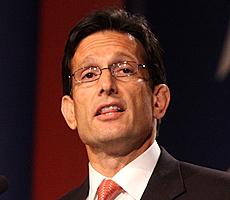Over the cliff in a barrel
By Wes Pruden
PrudenPolitics.com
The Republicans are looking for the best way to fall off Fiscal Cliff, which has become a place fixed in the geography of public opinion, like Sioux Falls and Grand Canyon. If a man can survive going over Niagara Falls (another famous fixed place) in a barrel, maybe the Republicans can survive falling off Fiscal Cliff in a barrel with John Boehner.
The latest Republican gimmick is to split the
difference on income-tax rates between the current
rate of 35 percent and the Clinton-era rate of 39.6
– and with substantial cuts in government spending.
This is the solution the pilots of an earlier
generation might call “coming home on a wing and a
prayer.”
There’s no indication that President Obama will
bite, nor is there any reason why, from his point of
view, he should. He has read the fear in Republican
eyes and he’s willing – maybe eager – to jump off
the cliff in the sure and certain confidence that
with the compliant mainstream media at his back, he
can successfully pin the blame on the Republicans
for the consequences.
He
can even promise spending cuts, secure in the
knowledge that he won’t have to actually make them.
Promises are a sucker’s game, and there’s no
shortage of suckers. Mr. Obama clearly wants to
humiliate the Republicans – re-election was not
enough – and he and his Democratic allies think his
victory on Nov. 6 arms him with a mandate to do as
he pleases.
There’s no longer an argument over whether to raise
taxes, only by how much. Some of the Republicans
eager to cave now and get the details of surrender
out of the way talk bravely of demanding spending
cuts as the price of higher taxes to finance the
president’s big-spending schemes, but they know in
their hearts that actual spending cuts are a pipe
dream. Raising taxes first, cut spending later, is a
scheme that has never worked. Republican presidents
played that shell game, too.
But Rep. David Camp of Michigan, the Republican
chairman of the tax-writing Ways and Means
Committee, tells Politico, the political daily, that
he is “reserving judgment” on such a scheme. “It
depends on the entire package,” he says. “What are
the spending [cuts] going to be? You can’t consider
that on its own without looking at all the other
factors that might go into it.” We can take that as
a probable yes, as soon as everybody indulges in a
little more big talk.
Rep. Nan Hayworth of New York sounds ready to quit
now, with a few goodbye clichés. “There’s certainly
a movement among us to accept that we indeed may
have to not let perfect be the enemy of the good. If
we can truly get a visionary plan, then I think we
will certainly be happy to give that the most
thoughtful consideration.”
The Republicans, including the speaker, are
negotiating as if they actually believe that
President Obama is negotiating in good faith. The
speaker’s offer of $800 billion in new taxes sank
without a salute. The president insists on soaking
“the rich,” even though the most thorough soaking
wouldn’t yield enough to make a sizable dent in
either debt or deficit. But it satisfies Mr. Obama’s
cult of covetousness, cupidity and spite, which
dreams of a scorched-earth class war, and would
redeem all his speeches from the president’s
community-organizing days.
Mr. Obama called in the Business Roundtable this
week for a little charm offensive. He told them that
he’s rooting for the success of big business because
when big business does well, “then small businesses
and medium-sized businesses up and down the chain
are doing well.” Someone should explain to the
president that a strong economy is based on the jobs
generated by small business, not big.
He
repeated his mantra that only he holds the key to
recovery. “What’s holding us back right now,” he
told the assembled CEOs, “is a lot of stuff that is
going on in this town. And I know that many of you
have come here to try to see, is there any way we
can break through this logjam. Nobody wants to get
this done more than me.”
Just do it his way. Rep. Eric Cantor, the House
majority leader, seems unimpressed. “An obsession to
raise taxes isn’t going to solve the problem. We
can’t just keep borrowing money and raising taxes
and expecting the problem to go away. That is our
point to the president.”

Eric Cantor. Photo by Gage Skidmore.
That’s precisely beside the president’s point. He
has bigger plans at Fiscal Cliff.
Wesley Pruden is editor emeritus of The Washington
Times.

